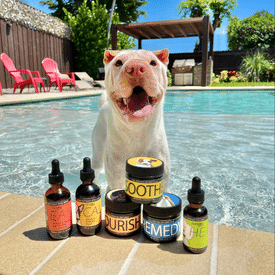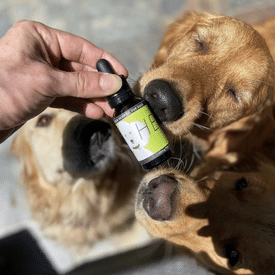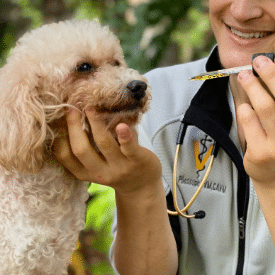Benefits of Mushrooms for Cats

Are mushrooms safe for cats? As a responsible pet owner, it’s natural to question if mushrooms for cats are right for your feline friend. While some mushrooms can be harmful to cats, others offer surprising health benefits. In this blog, we’ll address the common question “can cats eat mushrooms?” and delve into the potential advantages of incorporating medicinal mushrooms and mushroom extract tinctures into your cat’s diet, especially for those facing health challenges like cancer, tumors, autoimmune diseases, mental health issues, and more.
From answering common questions like “are mushrooms bad for cats?” to highlighting the potential benefits of mushrooms for cats, including support for liver and heart health, we’ll provide valuable insights to help you make informed decisions about your pet’s nutrition. Let’s dive into the fascinating world of mushrooms for cats and how they can promote feline well-being, both physically and mentally.
Table of Contents
What are Medicinal Mushrooms?
Medicinal mushrooms are a type of fungi that can safely be eaten and have many incredible medicinal properties to them. They are not to be confused with psilocybin, a hypnotic/hallucination-inducing mushroom. Also, while it may be tempting to forage for mushrooms yourself in your yard or the woods, we do not advise doing so since not all mushrooms are safe for cats, in fact many species of mushrooms can be quite harmful (or even fatal) to ourselves and our pets. Let us do the foraging for you!
Medicinal mushrooms contain many important compounds, such as polysaccharides, terpenes, protein, fiber, potassium, vitamin D1, and vitamin B12, among many others. Each type of mushroom has its unique benefits and properties, but they are all similar in that they are potent prebiotics and contain anticancer, antitumor, antiviral, and antibacterial properties.
Medicinal mushrooms have been used safely and effectively for centuries and have recently become quite popular as people turn to alternative medicine in the wake of big pharma’s overriding of our healthcare system.
Medicinal mushrooms are used for many purposes, to name a few:
- Fight cancer
- Eliminate tumors/growths
- Support mental health and focus
- Manage autoimmune disease
- Fight viruses and bacterial infections
- Improve gut microbiome function and balance
- Protect organs like the liver and heart
Can Cats Eat Mushrooms? Are Mushrooms Bad for Cats?
Incorporating medicinal mushrooms into your cat’s diet is not only remarkably safe but also offers a myriad of potential health benefits. These powerful fungi have been used for centuries in traditional medicine to address various health concerns in both humans and animals. When administered appropriately, medicinal mushrooms for cats can aid in managing a wide range of conditions and symptoms in cats, including immune system support, inflammation reduction, and even assistance in combating certain types of cancer.
With their rich array of bioactive compounds, medicinal mushrooms have garnered attention for their potential to promote overall well-being and enhance the quality of life for our feline companions. Using medicinal mushrooms for cats is not only incredibly safe but can help with a variety of conditions and symptoms:
Mushrooms for Cats with Kidney Disease
Possibly the most diagnosed illness among cats, kidney disease is a problem many cat owners will face. Mushrooms like cordyceps pack a punch when dealing with kidney disease. Cordyceps has been shown to help the kidneys process toxins and support kidney function. This is especially important if your cat is on any medications for kidney disease since this mushroom will help protect their body from the toxins many medications contain.
Related: CBD for Kidney Disease
Mushrooms for Cats with Diabetes
Another illness plaguing our feline companions is diabetes. This can be a challenging disease to manage, but several species of medicinal mushrooms have shown promising results in managing diabetes by helping to regulate blood sugar. This is possible mainly due to the unique fiber content in mushrooms called polysaccharides.
Mushrooms for Cats with Viral Infections
FIV, herpes, and calicivirus are all common viral issues cats face. Due to medicinal mushrooms’ potent antiviral properties and ability to modulate the immune system, they are a very gentle yet effective option for these conditions. Our unique formulation of immune-modulating mushrooms plus adaptogens, Vitality, is a perfect fit for any cat dealing with a viral illness.
Mushrooms for Cats with IBD
Medicinal mushrooms are a fantastic tool in battling IBD in cats (alongside full spectrum hemp extract CBD for IBD, which is even better)! They are a potent anti-inflammatory, and the beta-glucans and polysaccharides found in medicinal mushrooms help regulate the microbiome by acting as a prebiotic fiber source.
Mushrooms for Cats with Bronchitis & Asthma

Using Breathe by MycoCat will give you the best mushrooms for respiratory issues and still be quite palatable for your cat due to its organic glycerin base. It’s also safe for diabetic cats since glycerin does not affect blood sugar despite its sweet taste.
Mushrooms for Cats with Arthritis
While not traditionally seen as an arthritis remedy, medicinal mushrooms are a great adjunct to whatever arthritis treatments you’re already using (like CBD for cats with arthritis!). As mentioned previously, mushrooms are a great anti-inflammatory. Due to their unique polysaccharides, mushrooms can help lessen and prevent further joint deterioration and damage. In addition, they are loaded with antioxidants, which help fight free radicals and oxidative stress that damage joint tissue and its surrounding fluid.
Mushrooms for Cats with Cognitive Decline

Related: Cognitive Decline in Pets
Mushrooms for Cats with Cancer
If your cat has cancer, medicinal mushrooms are a MUST. Using mushrooms alongside adaptogens like full-spectrum hemp extract, astragalus, and other cancer-fighting plant medicine is going to give your cat the best chance of overcoming this awful disease.
Mushrooms like Turkey Tail are most noted and studied for their cancer-fighting effects. Polysaccharide K (PSK) is the most notable active compound in turkey tail mushrooms. In Japan, PSK is an approved mushroom product used to treat cancer. Reishi has also been studied and found to have many cancer-fighting properties. In addition, using mushrooms alongside traditional cancer treatments like chemotherapy is hugely beneficial and can even enhance their effects. So, no matter what route you take, using mushrooms to manage your cat’s cancer is a good idea.

Regarding cancer, using multiple compounds simultaneously in synergy yields the best effect. That’s why Angela Ardolino made Vitality, a perfectly combined formula using EIGHT different mushrooms plus adaptogens in an organic coconut glycerin base. This combination makes MycoCat Vitality palatable and POWERFUL in its cancer-fighting effects.
How Do I Give My Cat Mushrooms?
Medicinal mushrooms come in various forms but are most commonly found in powder, liquid, or treat form. While powder and treat forms can be convenient options, they have medicinal properties different from a properly extracted liquid product. I equate powders, capsules, and chews to be more like “functional foods” and liquid extracts to be more genuinely medicinal.
Therefore, when dealing with illness, a liquid mushroom extract is best. MycoCat formulas are all in an organic coconut glycerin base, making them potent, highly palatable to your cat, and entirely safe for even diabetic cats since cats cannot metabolize glycerin. Therefore, it will not affect blood sugar.
Dosing your cat with mushrooms is as easy as squeezing the dropper full of MycoCat mushroom extract for cats onto their food or directly in their mouth (if they’ll let you). However you choose to administer the mushrooms is acceptable and will not affect their potency or efficacy.
Supporting Your Cat’s Best Health
Using medicinal mushrooms for cats for almost any reason is a good reason! Whether you’re dealing with feline cancer, IBD, or cognitive issues, mushrooms for cats can help.
However, using mushrooms alongside Full Spectrum Hemp Extract is the most powerful way to support and balance your cat’s endocannabinoid system, in turn balancing every other system in their body.
Related: Benefits of CBD oil for Cats
















